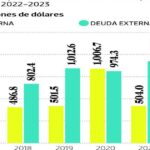Global Courant 2023-04-21 14:23:32
China’s powerful equity rally has a remarkably important driver behind it: the country’s 1.4 billion consumers.
After a lackluster start, households are finally stepping into the post-Covid-19 reopening of business – and they are doing so en masse.
In March alone retail up 10.6% year over year. Chinese consumers purchased a total of $1.67 trillion worth of goods and services in the first quarter, according to the National Bureau of Statistics. That’s more than Canada’s annual gross domestic product.
Perhaps the even better news is the wide range of sectors in which Chinese are pouring money. One of these is the country’s formerly empty malls, which people flock to. In addition to indulging in clothing, they spend a lot of money on wellness – on exercise equipment, gym memberships, and spa-related activities.
Leisure travel is experiencing a sudden boom, a real hit for hospitality businesses in Asia’s largest economy. Dining and entertainment are also exploding as Covid curbs are disappearing.
The film complex industry is a good example of this. During a recent seven-day holiday, ticket sales were up 15% from 2019 levels – worth more than $990 million.
Big ticket purchases are moving in the right direction, although not as robust as President Xi Jinping might have hoped. As economist Shehzad Qazi of consulting firm China Beige Book notes, car sales are not booming as expected.
Apartment sales increased by 3.5% in January-February. While it’s barely enough to make up for the 22% drop in the corresponding two months in 2022, it’s a sign that the covid reopening of trading is gaining momentum.
Global investors are taking notice
“Chinese stock markets are on the rise again after a volatile start to the year,” said economist Thomas Gatley of Gavekal Research. “Gains are supported by strong economic momentum in the form of accelerating lending, as well as improving household confidence and appetite for risky assets.”
The credit expansion that Gatley refers to is compliments of the People’s Bank of China. Last month, PBOC Governor Yi Gang surprised markets by cutting reserve requirements for all banks by 25 basis points. At the time, Yi’s team characterized the move as part of efforts to “make a good combination of macro policies, improve the level of service to the real economy and keep liquidity in the banking system reasonably adequate.”
For economist Carlos Casanova of Union Bancaire Privée, the signal to Chinese business is that the central bank is eager to support growth, but is averse to creating new bubbles. “While the pace of liquidity expansion slowed marginally, it remains very high and significantly above the government’s target of being broadly in line with nominal GDP growth.” But not high enough, he adds, to fuel new overheating risks.
That support is bolstered by improving exports, which rose nearly 15% year-on-year in March to help China reach a growth rate of 4.5%.
“The economic recovery is well on track,” said economist Zhang Zhiwei of Pinpoint Asset Management. “The bright spot is consumption, which is picking up as household confidence improves and strong export growth in March.”
This dynamic confirms the rationale for this year’s 10% rally in Chinese equities.
Strategist David Wong at AllianceBernstein speaks for many when he says mainland valuations are still attractive and economic and earnings momentum is yet to come. William Yuen, investment director at Invesco, states that “the reopening of trading is by no means over” as data suggests “things are improving” on a month-over-month and year-over-year basis.
Of course, global headwinds can intervene. As Citigroup strategist Matt King puts it, central banks around the world are pulling back as much as $800 billion in stimulus to curb inflation risks. That could be a huge problem, given that global equities have been backed by more than $1 trillion in central bank liquidity.
That tsunami of money, says King, has “kept real yields low, supported equity multiples and narrowed credit spreads in the face of falling earnings expectations.”
For similar reasons, Nick Ferres, chief investment officer of hedge fund Vantage Point Asset Management, is concerned that the “market breadth that supported the rally was extremely poor. Equity investors seem to want all the benefits of interest rate cuts, without enduring the pain that would warrant them.”
With China, Gatley says in Gavekal, the MSCI China index rose 17% in January alone as foreign investors bought into the busy reopening trade, before giving up all those gains in February as disillusionment set in and onshore investors hesitated to commit. to join the party.
Gatley says: “However, the rally since mid-March appears to be of a different nature, as gains in Chinese equities are now supported by strong economic momentum in the form of improving credit, as well as improving household confidence and increased appetite for risky assets. . ”
For now, adds Gatley, “Chinese households are not yet fully diving into the stock market, but they are certainly testing the waters and feeling more comfortable. This combination of accelerating credit flows, improving macroeconomic data on households and consumers and much improved market sentiment indicators is a powerful mix that should continue to drive Chinese equities higher.”
But data for March, he explains, showed that those positive expectations are “not unfounded.” Unemployment in the cities fell to 5.3% in March. “That is evidence that the massive disruptions for businesses in the service sector from Covid lockdowns and restrictions are starting to heal and that the job market is tightening again,” says Gatley.
The underlying economy also gives investors more confidence. “In short, with this GDP report, we think there is no immediate need for the government to massively stimulate the economy,” says economist Iris Pang of ING Bank.
Challenges remain
However, more needs to be done to ensure policymaking in Beijing keeps pace with investor bullishness. For Xi’s new prime minister, Li Qiang, that means increased efforts to give the private sector more economic space to thrive, create new jobs and boost national productivity.
The recent move to split Alibaba Group into six units – and the return of founder Jack Ma to China – is an essential step in that direction. And to reassure global investors that the regulatory crackdown on Big Tech is over.
As analyst Kelvin Ho of Fitch Ratings points out, “Value improvement could come from individual companies gaining more focus, autonomy and accountability. Alibaba may also be able to unlock value through spin-offs or IPOs. This could boost Alibaba’s creditworthiness as capital is freed up from low-cash-generating companies and deployed in stronger cash-generating businesses, or used to service debt.”
It follows that Alibaba’s restructuring plan could become a model for other internet giants at risk, including Baidu, ByteDance, Didi, Tencent and others.
Li’s reform team also needs to make progress by creating a larger and more extensive network of social safety nets. That is the clearest way to get Chinese households to spend more and save less.
Economist Nicholas Lardy of the Peterson Institute for International Economics notes that a “return to a consumption-led growth model will require an expansion of household disposable income and further strengthening of the social safety net”.
To that end, he says, “ending zero-Covid lockdowns, which pushed millions of workers out of the workforce, will boost incomes. Social programs still do not cover enough people with only modest benefits and need to be expanded.”
Lardy adds that “China needs to spend more on its people if it wants its people to spend more. But none of these changes can be achieved in the short term.”
Li’s team is under pressure to score some big reform victories, and the sooner the better. For now, however, the health of the economic recovery is signaling to investors that their exuberance about China is not irrational.
Similar:
Loading…








